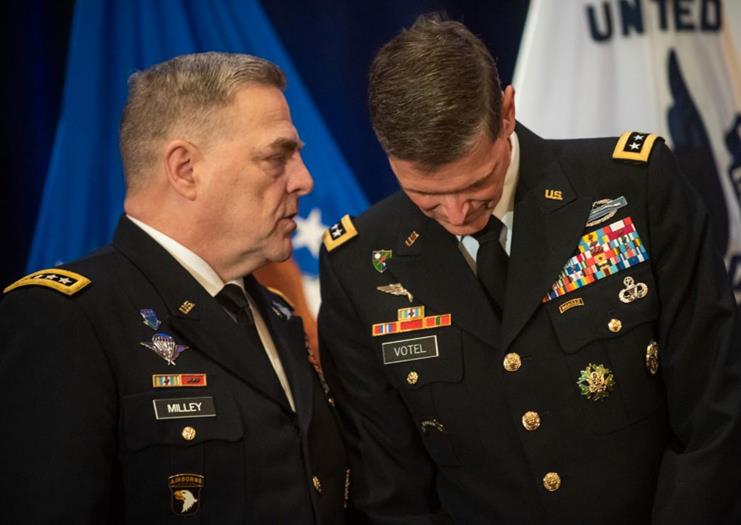With international tensions high on the eve of the November 2020 election, Joint Chiefs Chairman Gen. Mark Milley assured his Chinese counterpart, Gen. Li Zuocheng, that he was prepared to frustrate any potential military operation by America’s commander-in-chief, President Donald Trump.
“General Li, you and I have known each other for now five years. If we’re going to attack, I’m going to call you ahead of time,” Milley said, according to reporting by journalists Bob Woodward and Robert Costa. “It’s not going to be a surprise. It’s not going to be a bolt out of the blue.”
Milley, who is testifying before Congress today about his decisions during the United States’ disastrous withdrawal from Afghanistan, made a second panicked call to Li on Jan. 8, 2021, two days after the Capitol Building riot.
Woodward and Costa revealed the contents of those calls and much more in their new book, Peril. Painted with “transcripts of confidential calls, diaries, emails, meeting notes and other personal and government records,” the authors’ portrayal of Milley is that of a disturbed apparatchik with apocalyptic visions. He is impulsive, driven by fear, prone toward emotional outbursts, and yet so convinced of his superior judgment that he unilaterally assumed the powers of commander in chief. If what Woodward and Costa write about Milley’s behavior are true, his emotional instability requires action and investigation as a national security concern.
To be clear, backchannel military discussions with China are not inherently problematic. Milley’s role is partly diplomatic; he is supposed to communicate with foreign countries, especially China as a rising great power and economic rival.
However, the account laid out by Woodward and Costa suggests Milley went much further, deliberately usurping the civilian control of the military. Moreover, Milley’s terrified communiqués with Li may have prompted China’s fear of aggressive military action by the United States. Rather than de-escalating the situation, Milley likely intensified China’s worries about the potential for an errant, politically motivated military strike from the Trump administration, while compromising sensitive intelligence sources. This sort of brash behavior has been a feature of Milley’s career.
During last year’s George Floyd riots, Trump aide Stephen Miller compared the mayhem to something out of the Third World. Joint Chiefs Chairman Milley responded by telling Miller to “shut the f*** up.” Milley also apologized for having his picture taken with Trump during the latter’s walk across Lafayette Square after D.C. had been rocked by rioting. “I should not have been there,” Milley said. “My presence in that moment and in that environment created a perception of the military involved in domestic politics.”
In March this year, Milley had a heated exchange at a National Security Principals Committee meeting, where he pleaded to keep U.S. troops in Afghanistan so that women’s rights in the region wouldn’t “go back to the Stone Age.” President Joe Biden’s Defense Secretary Lloyd Austin actually rebuked Milley because of his behavior. “We’re not going to make decisions based on emotion,” Austin said, playing the part of the composed adult against a hysterical Joint Chiefs Chairman appointed by a conservative president.
Milley’s capriciousness reached its peak during the presidential transition period. As the events of Jan. 6 unfolded in the Capitol Building, Milley directly liaised with Vice President Mike Pence, House Speaker Pelosi, and Senate Leader Mitch McConnell, apparently going around Trump and Acting Secretary of Defense Chris Miller. The neoconservative pundit Bill Kristol, among others, described this as a de facto invocation of the 25th Amendment. He’s right. The Joint Chiefs Chairman is under no obligation to communicate with the speaker or leader, let alone Senator Schumer, as that position reports to the president, not Congress. Politically, Pelosi and Schumer rule in their respective houses; they have no authority in military affairs. The exclusion of the president and his other duly appointed officials created a dangerous situation that, in effect, amounted to a seizure of power.
On Jan. 8, Milley went further, approaching members of the Nuclear Military Command Center to demand they do not take orders without him involved. The National Military Command Center, which is responsible for nuclear missile launch control, falls under the purview of the Joint Chiefs, so any reminder of that command structure would seem redundant. Why did Milley feel this was necessary? One unsettling possibility is that Milley was concerned that a service member would inform the president that the Joint Chiefs chairman was organizing a coup d’état. Layered over this are claims by Woodward and Costa that Milley conducted a widespread, military-led mobilization of the national security apparatus in response to his paranoia about Trump’s hypothetical actions.
Woodward and Costa’s reporting put Gen. Milley’s ability to make rational decisions regarding national security in question. Even ardent Trump critic Alexander Vindman, who served on the National Security Council and testified against Trump in the House impeachment inquiry, has called on Milley to resign. “If we want our institutions to be our guardrails rather than relying on a constant supply of individual saviors, we should hold our leaders accountable,” Vindman wrote.
The United States military is under civilian control through the president and his appointees for a reason. Most Americans agree with and appreciate that safeguard. But now, several books, transcripts, emails, and eyewitness accounts show a Joint Chiefs Chairman dominated by fear and paranoia usurped that civilian authority and actively organized the national security establishment against a sitting president. If these reports are even half-true, Milley and the people who worked with him are complicit in a treacherous plot of the highest order against the public.
Reforming the military leadership that produced and promoted Milley ought to be a priority of the highest order. President Biden and Congress must move fast and come down hard on the national security establishment. We need public hearings and transparency. Milley and his co-conspirators must face justice for overreaching their authority.
Image Credit:
Flickr-Chairman of the Joint Chiefs of Staff, CC BY 2.0

Leave a Reply